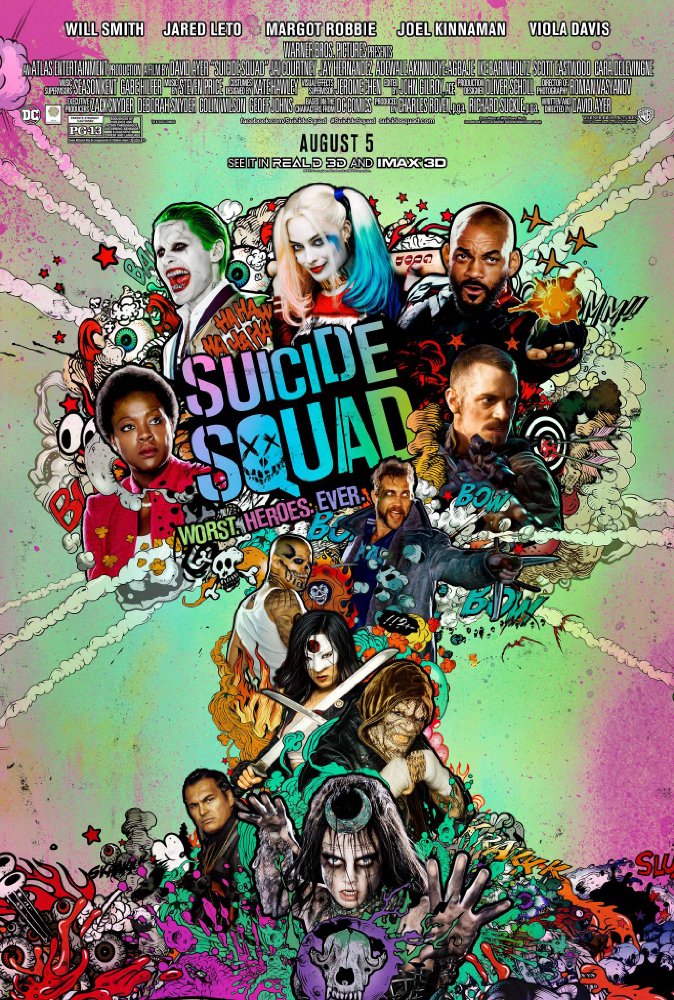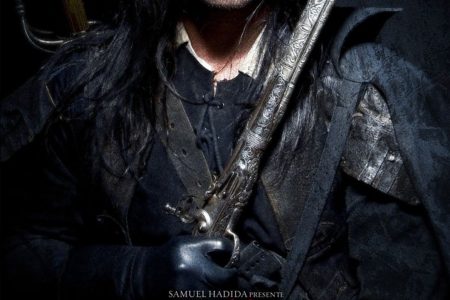The US critics seem to have been particularly harsh towards Suicide Squad – I’m not sure what they were expecting, but it could have been anticipation that has built up over what seems like ages in a very clever marketing campaign to introduce mostly unknown comic book characters to the wider public. (And when writer/director David Ayer talks about making the film ‘for the fans’, exactly how many fans does he think the comic book has? Comics do not have a very large audience, and Suicide Squad is not a popular book, so unless they’ve been a big hit on the various DC television shows, he’s talking about a few hundred thousand, tops.) The film is not a disaster by any means – it’s perfectly serviceable entertainment, even if it has flaws and shows the joins where reshoots and studio edits have shuffled things around (based on previous Ayer films, the lightening of the tone was probably a good thing, because he tends towards dark and doesn’t have a great sense of humour).
Following on from Batman V Superman: Dawn of Justice (so spoilers for anyone who hasn’t seen that film), Suicide Squad sees Amanda Waller (Viola Davis) presenting her Task Force X collection of supervillains as a government-controlled, off-the-books response team to meta-human threats: Deadshot (Will Smith), the assassin who doesn’t miss; Harley Quinn (Margot Robbie), the psychiatrist turned psycho when she fell in love with the Joker (Jared Leto); Killer Croc (Adewale Akinnuoye-Ajbaje), deformed, strong, cannibalistic; Diablo (Jay Hernandez), capable of generating and controlling fire; Boomerang (Jai Courtney), a thief who kills with boomerangs; the Enchantress (Cara Delevingne), the spirit of an alien who has been on this planet for thousands of years, currently occupying a human host, and controlled by Waller’s possession of her heart and the spirit of her brother. The team will be led on ops by Rick Flag (Joel Kinnaman), who is not a supervillain, to make the people in charge feel slightly more comfortable, accompanied by his ‘bodyguard’, Katana (Karen Fukuhara).
A digression: Task Force X is presented as a team of villains with special skills, but what exactly is Harley Quinn’s special power? Was she turned super-strong or lethal when she fell in the vat of acid? Because all she does is hit people with a baseball bat or shoot them with a pistol. Am I missing something?
The characters are introduced with the visual equivalent of a Top Trumps card and flashbacks, which allows the introduction of the Joker into the story, and the team is assembled from the prison in Belle Reve. Before they are given a specific mission that they were assembled for, they are sent to Midway City to neutralise a ‘terrorist threat’ – in reality, the Enchantress has escaped, freed her brother and is creating a machine that will destroy the world. For reasons? And team goes into action …
The film works fine in sections – Ayer shoots a decent action scene, Robbie is perfect as Harley Quinn, Smith puts all his charm into Deadshot (who was always the breakout character in the comic book), and Davis displays the correct steeliness for The Wall (although I thought the decision to show her ‘gangsta’ side, as Deadshot describes it, as a cheap way of doing it and detracted from the iron-willed character created by John Ostrander). There is some humour – Robbie gets most of the best lines, although the biggest laugh in the Peckhamplex was for Killer Croc’s ‘B.E.T.’ one-word response – but it’s not Deadpool or Guardians of the Galaxy. The film is fairly stylish (the pop-video aesthetic works rather well with the team, although how much money was spent on the music rights? There are loads of well-known songs used in varying amounts throughout the film) and tells a fairly traditional comic book story just with supervillains doing the heroics. I quite liked the inclusion of Ben Affleck’s Batman in several flashback scenes, and the Flash capturing Boomerang was a good indication of the approach and Ezra Miller’s handling of the character. The film-makers put in a nod for the creator of the comic book with the ‘John F Ostrander Federal Building’, and a flashback scene for Joker and Harley is a cinematic recreation of the Alex Ross cover for Harley’s DC debut, Batman: Harley Quinn #1.

The film loses points in the details. Waller is supposed to be smart, motivated, in control, but the ease with which Enchantress is able to escape and find her brother was ludicrous. The squad is supposed to be a unit that can be sent in as deniable, expendable grunts, yet they are accompanied into Midway City with two squads of special-ops soldiers – erm, why? The Joker is a distraction, perhaps put in for recognition value – Leto does a great Joker laugh but the script serves him as the rap-video gangsta version of the Joker – and I would have preferred his involvement if he were the target of the Squad’s mission. The actual mission is let down by the non-descript ‘evil person wants to destroy the world’ villain (and the rather poor performance by Delevingne). The original comic book series by Ostrander, a series I’m a big fan of, always had a socio-political aspect to them – Ostrander (and later with his wife, Kim Yale) grounded the series in reality and dubious nature of world politics, which gave the book its edge. A CGI identikit villain isn’t what the Squad is about; the proliferation of superhero films has led to an escalation of antagonists so that a film has to have a world-ending problem to deal with or it doesn’t have a point in the minds of studio executives.
I wonder if the Squad would work better as a television series – the comic book worked because it gave character to B- and C-list supervillains so you cared about them, something that a film is hard-pressed to do (the dynamics of a movie require concentrating on fewer characters and resolving issues in a limited running time); a television series would allow more depth, a greater variety of antagonists and operations for the team, and the ability to highlight different members. But that’s a passing fantasy of mine – the film and television worlds of DC seem to be completely separate units, with a more positive vibe to the various superheroes.
Suicide Squad is fine as a movie – it’s not doing anything original, it’s better than Batman V Superman: Dawn of Justice (and a lot of other truly terrible DC films – Supergirl, Steel, Jonah Hex), and there’s plenty to enjoy, especially if you’re a fan of the original comic book. Don’t let the US critics put you off, but at the same time there’s no need to rush to the cinema either.
Rating: DVD




